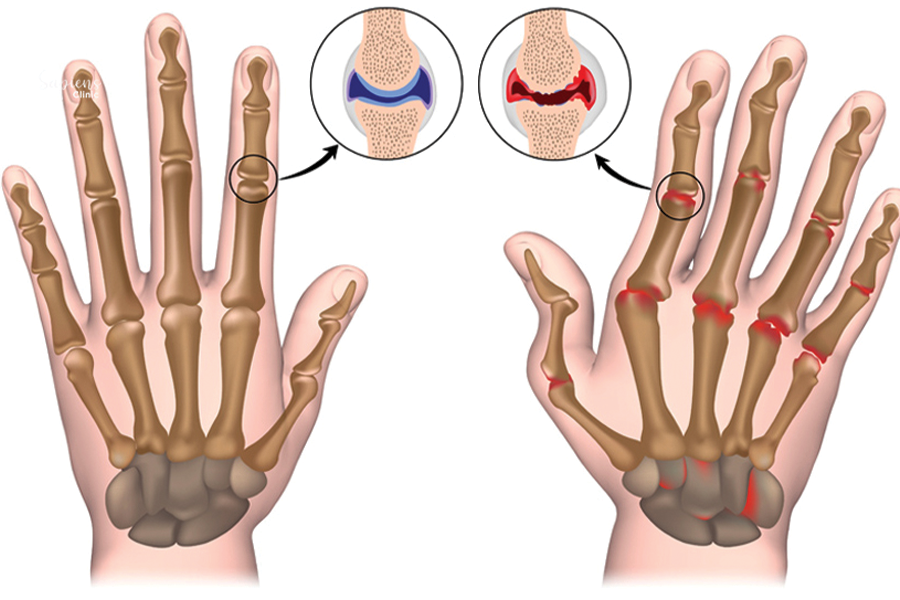Rheumatoid Arthritis: Comprehensive Care and Management in Malleshwaram
Rheumatoid arthritis (RA) is a chronic autoimmune disorder that primarily affects the joints, leading to pain, swelling, and potential joint deformity. At Sapiens Clinic in Malleshwaram, we specialize in the diagnosis and management of RA, aiming to alleviate symptoms, prevent joint damage, and improve overall quality of life.
Understanding Rheumatoid Arthritis
RA occurs when the immune system mistakenly attacks the synovium-the lining of the membranes that surround the joints. This immune response causes inflammation that can eventually result in joint damage and deformity. Unlike osteoarthritis, which is due to wear and tear, RA affects the lining of the joints, leading to painful swelling that can cause bone erosion and joint deformity.
Causes and Risk Factors
While the exact cause of RA remains unknown, several factors may contribute to its development:
- Genetic Predisposition: Certain genes may increase susceptibility.
- Environmental Factors: Exposure to certain viruses or bacteria.
- Hormonal Factors: RA is more common in women, suggesting hormones may play a role.
- Lifestyle Factors: Smoking and obesity can increase the risk and severity of RA.
Symptoms
RA symptoms can vary in severity and may include:
- Joint Pain and Swelling: Particularly in smaller joints like fingers and toes.
- Morning Stiffness: Stiffness lasting for 45 minutes or more.
- Fatigue: Persistent tiredness and lack of energy.
- Fever and Weight Loss: Occasionally present during flare-ups.
- Symmetrical Joint Involvement: Affecting joints on both sides of the body.
RA can also affect other systems, leading to complications in the skin, eyes, lungs, heart and blood vessels.
Diagnosis
Diagnosing RA involves a combination of :
- Medical History and Physical Examination: Assessing symptoms and joint function.
- Blood Tests: Including rheumatoid factor (RF), anti-CCP antibodies, ESR, and CRP levels.
- Imaging Studies: X-rays, ultrasound, or MRI to detect joint damage and inflammation.
Early diagnosis is crucial to prevent irreversible joint damage.
Treatment Options
While there is no cure for RA, various treatments can help manage symptoms and improve quality of life :
Medications
- Nonsteroidal Anti-Inflammatory Drugs (NSAIDs): Reduce pain and inflammation.
- Corticosteroids: Provide quick relief but are used short-term due to side effects.
- Disease-Modifying Antirheumatic Drugs (DMARDs): Slow disease progression and prevent joint damage.
- Biologic Agents: Target specific parts of the immune system.
- Janus Kinase (JAK) Inhibitors: Block specific pathways involved in the immune response.
Lifestyle and Supportive Therapies
- Physical and Occupational Therapy: Improve joint flexibility and strength.
- Regular Exercise: Low-impact activities like walking and swimming.
- Healthy Diet: Emphasizing anti-inflammatory foods.
- Stress Management: Techniques like meditation and counseling.
Surgical Intervention
In cases of severe joint damage, surgical options may include :
- Synovectomy: Removal of the inflamed joint lining.
- Tendon Repair: Repairing tendons around the joint.
- Joint Fusion: Stabilizing or realigning a joint.
- Total Joint Replacement: Replacing the damaged joint with a prosthesis.
Living with Rheumatoid Arthritis
Managing RA is a lifelong commitment that involves :
- Regular Medical Check-ups: Monitoring disease progression and treatment efficacy.
- Adherence to Treatment Plans: Taking medications as prescribed.
- Lifestyle Modifications: Maintaining a healthy weight, quitting smoking, and staying active.
- Support Systems: Engaging with support groups and counseling services.
With proper management, many individuals with RA lead active and fulfilling lives.
Conclusion
Rheumatoid arthritis is a complex autoimmune disease that requires comprehensive care. At Sapiens Clinic, Malleshwaram, our multidisciplinary team is dedicated to providing personalized treatment plans, combining medical therapy with lifestyle interventions to manage symptoms and improve quality of life.
FAQs
1. Is rheumatoid arthritis curable?
Currently, there is no cure for RA, but early and aggressive treatment can control symptoms and prevent joint damage.
2. Can lifestyle changes help manage RA?
Yes, regular exercise, a healthy diet, stress management, and quitting smoking can significantly impact disease progression and symptom severity.
3. What is the difference between RA and osteoarthritis?
RA is an autoimmune disease causing joint inflammation, while osteoarthritis is a degenerative joint disease resulting from wear and tear.
4. Are there any dietary recommendations for RA patients?
An anti-inflammatory diet rich in fruits, vegetables, whole grains, and omega-3 fatty acids may help reduce symptoms.
5. How often should I see my rheumatologist?
Regular follow-ups, typically every 3 to 6 months, are essential to monitor disease activity and adjust treatment as needed.

Leave a Reply